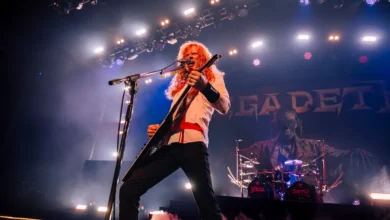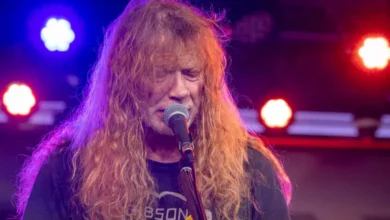Erik Grönwall’s “Hallelujah”: A Rock Survivor’s Most Emotional Performance Yet
When Swedish powerhouse Erik Grönwall quietly dropped his rock-flavored version of Leonard Cohen’s Hallelujah on his socials and YouTube, it didn’t land like a modest weekend cover — it landed like a statement. Here was the same singer who once tore through Iron Maiden and Skid Row material on TV, now stepping into one of the most over-sung songs on earth and somehow making people listen again. The clip began circulating fast in rock circles, fan groups, and cover communities, with comments piling up from people who’d heard every imaginable Hallelujah… and were still stunned by this one.
Part of the magic was context. This wasn’t just any metal-leaning vocalist trying on a classic. This was Erik Grönwall, the kid who won Swedish Idol in 2009 singing high-octane rock, the frontman who later powered H.E.A.T., and the singer who, in 2022, became the voice of Skid Row — a job most viewers of his Idol clips would have called “impossible but perfect.” So when he sat in front of the camera in 2025 and chose restraint over fireworks, people knew they were watching an artist who’d already climbed the loudest mountains and now wanted to show what he could do in a whisper.
What made it even more gripping was the timeline of his life. In March 2021, Grönwall was battling acute lymphoblastic leukemia, undergoing treatment and later a bone marrow transplant — a fight that would have ended most touring careers. He recovered, returned, joined one of the most road-heavy bands in hard rock, and then, in March 2024, stepped away from Skid Row because the pace just wasn’t compatible with full healing. That’s the guy singing Hallelujah: a survivor with nothing to prove but everything to feel. Fans knew it, and they heard every bit of that journey in his phrasing.
So the performance played like testimony, not content. He didn’t try to out-belt Cohen or out-soul Jeff Buckley; he went for the emotional center, the part that says “I was broken, now I’m grateful,” which hits differently coming from someone who’s publicly talked about compromised immunity, family life in Sweden, and needing to slow down after years of pushing. That biographical weight made lines like “maybe there’s a God above” feel less like poetry and more like a status update from someone who’s stared down chemo rooms and come back to a microphone.
Musically, the arrangement sat in that sweet spot between rock and reverence. It kept the recognizable harmonic shape of Cohen’s original while adding lift in the choruses, the kind of lift Grönwall can deliver without straining because he’s spent a career singing Queen, Europe, and Skid Row material. It was polished enough to be shareable, but not so overproduced that it lost intimacy — you still heard breath, room, and a human singing to actual people, not to an algorithm. That balance is exactly why it spread on Facebook pages dedicated to metal covers, where fans can sniff out soulless productions in seconds.
Another reason it popped: people were primed for Erik to do emotional material. His Idol run back in 2009 included big, theatrical songs — Queen’s The Show Must Go On among them — but audiences always responded strongest when he mixed power with vulnerability. Hallelujah let him repeat that formula for a 2025 internet crowd that now knew the leukemia chapter and had seen him front a legacy American band. It was the same voice, just seasoned, grateful, and fully aware that not everybody gets a second, let alone third, act.
And then there were the comments. Buried among the usual “goosebumps” and “this is the version” you started to see a particular kind of praise: older listeners — people in their fifties and sixties — saying they’d heard the hymn every Christmas, every funeral, every talent show, and yet this one moved them. That matters, because Hallelujah is a song with listener fatigue built in; to touch people who are done with it, you have to come in honest, not clever. Erik’s video did exactly that, which is why fan pages were quoting reactions like “favorite version I’ve ever heard” and “we played this all last season.”
The timing also helped. By early 2025, news of his 2024 decision to leave Skid Row to prioritize health had settled, and interviews in 2024–25 made it clear he still loved the band but couldn’t live on airplanes with an immune system that sometimes behaved, in his own words, “like a four-year-old catching everything.” That left fans wondering what solo Erik would sound like going forward. Dropping Hallelujah was like answering that question with, “I can stay home in Sweden, protect my health, and still out-sing almost anyone when I feel like it.”
From a journalistic angle, the cut is also a neat case study in how modern rock singers keep their audience between big gigs. Ten years ago, you needed a label cycle and a tour. Now, if you’ve got name recognition and a room with good light, you can cover a sacred song, hit upload, and reach a million people who still remember you yelling 18 and Life on national TV. Erik has been doing exactly that, turning his YouTube channel and Facebook into a running diary of what he’s singing, how he’s feeling, and how his recovery is going. Hallelujah just happened to be the most shareable installment.
It also sits inside the longer story of Hallelujah itself — a song Cohen released to modest response, that then became a cathedral for cover singers: Jeff Buckley’s fragile take, k.d. lang’s soaring rendition, Rufus Wainwright, countless TV contestants. Dropping a rock-voiced, cancer-survivor, ex-Skid Row version into that lineage in 2025 shows how open the song remains: every generation can carve its own scar into it, and audiences will still listen because the lyric is big enough to hold different kinds of pain. Erik’s version is the “I made it through” reading.
What keeps viewers rewatching is the dynamism of his delivery. He starts controlled, almost conversational, then opens up with the kind of head voice and sustained notes you’d expect in arena rock. That slow rise mimics his own life arc — from winning Idol to almost losing his life to reentering stages — so when he hits the high section, it doesn’t feel like showing off, it feels inevitable. This is a guy whose instrument was nearly taken from him; of course he’s going to let it ring when he can.
Critically, it humanizes him after the Skid Row chapter. Leaving a classic band often gets reduced to “singer out, new singer in,” especially when a star like Lzzy Hale steps in. But Erik’s Hallelujah reminded everyone watching why he got that gig in the first place: the tone, the control, the heart. It reframed the 2024 split not as a setback but as a redirection toward music he can make sustainably, on his terms, without compromising immunity or family life. That narrative played well in comment sections tired of drama.
Another subtle layer is gratitude. In several posts around 2024–25 he’s talked about how Swedish healthcare and a bone marrow donor quite literally gave him back a future. You can hear that in the way he leans on the word “Hallelujah” — it’s not abstract worship; it’s thank-you-for-more-years. That’s powerful for fans who followed his illness from 2021 onward and for anyone watching in remission themselves. A cover like that becomes more than entertainment; it becomes proof.
From the industry side, it’s smart branding. Erik knows his audience straddles hard rock fans, Idol nostalgics, and now inspiration seekers who discovered him through his cancer story. Hallelujah hits all three: it’s vocally big enough for rock, familiar enough for casuals, and emotionally potent enough for people following his health journey. That’s why the video popped up not just on his channel but on metal-cover community pages, fan-run Facebooks, and music reaction channels on YouTube doing “Swedish rockstar sings Hallelujah” thumbnails.
It’s also worth noting that he released it during a moment when audiences are hungry for authenticity from rock singers. After years of perfectly tuned, algorithm-chasing content, fans are gravitating back to performances where the story behind the voice is visible. Erik’s version checks that box. You see the guy who couldn’t tour because of immune issues, the dad in Sweden, the ex-frontman who left on good terms but for serious reasons, sitting down and singing one of the most exposed songs ever written — and nailing it. That’s the definition of watchable.
In the end, what made this Hallelujah special wasn’t just vocal fireworks, although those were there. It was the convergence of timing (post-Skid Row pause), biography (leukemia survivor), song choice (a global hymn), and delivery (rock power controlled with maturity). That combination turned a four-minute cover into a little cultural checkpoint for his fans: yes, Erik Grönwall is still here, still singing like the walls should fall down, and still finding new ways to make a song we’ve all heard a thousand times feel like a personal update from someone who’s actually lived the word “hallelujah.”
In addition to his breathtaking take on Hallelujah, fans were quick to recall that Erik Grönwall had previously stunned audiences with his rendition of Whitney Houston’s timeless “I Will Always Love You.” That performance, delivered with both technical precision and emotional vulnerability, revealed the full scope of his vocal range and interpretive depth. Transitioning seamlessly from delicate falsettos to powerful belts, he honored Houston’s legacy while imprinting his own rock-soul identity on the classic. Together, the two covers — Hallelujah and I Will Always Love You — now stand as twin milestones in his evolution from powerhouse rocker to emotionally fearless storyteller.





